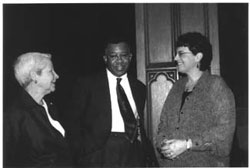Teachers College Awarded $178,000 from Kellogg Foundation for
The W.K. Kellogg Foundation has awarded a two-year grant to Teachers College for the "Developmental Visit Training and Dissemination Project." The Developmental Visit is a new approach for establishing an initial working relationship between children, their families, and their service providers. Associate Professor Susan L. Recchia, Co-Faculty Director of the Rita Gold Early Childhood Center, will be coordinating the Project.
The Developmental Visit was developed over a 16-year period by Dr. Annette Axtmann, the founding Director of the Center for Infants and Parents at Teachers College, with students babies, toddlers, parents and colleagues in the field of infancy. Axtmann is Senior Consultant on the Developmental Visit Project.
The Developmental Visit is an assessment, planning and training process which brings the parent, the infant and two of their providers together to learn from and about each other. Parent, child and providers contribute on an equal basis to plans for the well-being of the child. The aim of the Project is to make the Developmental Visit available to as wide a range of populations and service systems as possible.
According to Recchia, "what typically happens when you're doing an enrollment process with a family-where people are coming in for some kind of service for a young child-you might do a family history, and then do a separate assessment of the baby. There would be multiple practitioners carrying out these functions independently."
"The Developmental Visit is designed," Recchia continued, "to bring these functions together at one time. It's a way of gathering information from the family but also working together with the family. What's really unique is that a senior and junior practitioner are required to work together with this instrument. So it automatically builds professional mentoring and training into the process."
The Project will implement Kellogg's mission, said Axtmann, which is "to help people help themselves through the practical application of knowledge and resources to improve their quality of life and that of future generations."
Axtmann said, "Babies are our most promising and yet vulnerable citizens. Pathways in the human brain for empathy, trust, and learning develop in the first months of life. Knowing this, a variety of service systems are working to provide quality care for infants and their families. Quality care requires informed collaboration between the parent, the child, and the care providers. This collaboration can be strengthened, according to directors of national and local service systems, by the Developmental Visit."
In 1998 the Project Team conducted field trials of the Visit, which validated its usefulness for a variety of programs serving a wide range of families with very young children in the New York City area.
The Visit's two-fold vision is to establish a reciprocal working relationship among the infant, the parent and the providers and to professionalize practice.
"The first part of the Visit," said Recchia, "takes place in the family home, the clinic, the classroom or the family day care home---wherever the infant and the direct care provider expect to work together on a regular basis. Observations of the child and the parent and child together provide opportunities for the Visit Practitioner to illustrate how much the parent and the direct care provider can learn through observation. The infant's care giving and/or intervention experience is discussed. And plans including the parent's advice and the team's suggestions are made."
Recchia is careful not to call the Visit a formal assessment process. "It's really a rigorous way of beginning to secure clues about how a particular baby interfaces with the world. Participation in the Visit will inform the ways in which families and practitioners begin to work together to meet the child's and family's needs, and may reveal that the child or family need more formal assessment."
While Recchia and Axtmann agree that the Developmental Visit takes no more than one hour to administer, its key features are rigorously grounded in principles that reflect current knowledge of infant growth and development. "Despite its brevity, Axtmann said, the Developmental Visit can professionalize practice and provide a foundation for a collaborative relationship between the child, the parent, a senior and a junior member of the service system."
The grant will be developed in two phases. In Phase One, senior practitioners from nation-wide systems serving families with a wide range of ethnic and economic backgrounds will be trained to qualify as Visit Practitioners. They will attend a 5 Session Training Seminar at TC in January, 2001. The Seminar will be followed by Supervised Practice of the Visit by the trainees with families and junior providers in their service systems. Once the trained meet specific criteria they will be qualified as Visit Practitioners
At the end of Phase One, these Visit Practitioners will report the effect of the Visit in their service systems. Axtmann said, "the Kellogg Foundation is interested in how the Visit works with single mothers who are poor and illiterate. This will be interesting because the Visit doesn't require the parent to read and write. You just talk. It's oral. Other instruments that are presently being used often ask parents to fill out a form and read and write."
The evaluation will also inform Phase Two of the Project during which the Project team will write final versions of the Description of the Developmental Visit and the Administration Materials for publication.
Published Tuesday, Sep. 18, 2001
